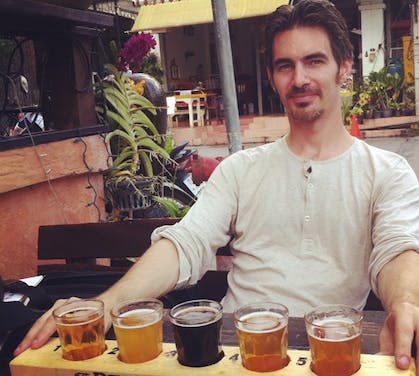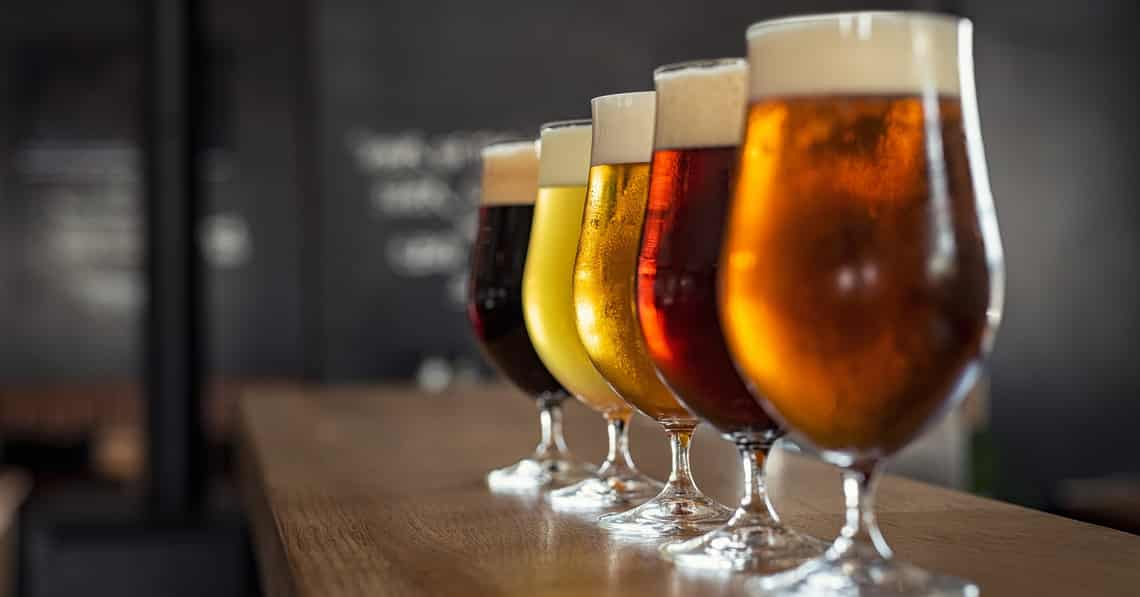
The author, sampling brews at Beer Republic
Upon arriving in Thailand, however, it’s not hard to notice the lack of variety when it comes to beer. Chang, Singha and Leo have been the proverbial Microsofts of beer here since 1934 when the Boon Rawd Brewery produced their first “standard” lager, Singha. Since then, Singha’s level of popularity in Thailand has fallen to second, behind that of the Thai Beverage Public Company Limited which produces Chang (as well as Sangsom).
With the first beer being produced in Thailand 80 years ago, the progress of Thai beer has transformed and expanded since its early roots. The Boon Rawd Brewery, in an attempt to regain market leader status in all things beer, launched Leo beer in June 1998. In order the counter this, The Thai Beer company focused on improving their existing brand, Chang, by enhancing product quality, sales promotions and discounts, even going so far as to immediately reduce the overall price of Chang beer upon the release of Leo and Super Leo. We had a full-fledged beer war on our hands.
The war rages on. Chang focuses largely on marketing itself with music promotions whereas Singha is more focused on branding itself with sports. Each tells their customer that theirs is the best and most popular beer. They can’t both be right, of course, and at the end, it comes down to individual preference. Do you prefer the stronger flavour of Chang or the lighter, summer lager style of Singha beers?
Not much to choose from, is there?
New Kids on the Block
Enter craft beers. The analogous third party hipster beers that have seized on the lack of beer diversity in Thailand. Using all natural ingredients, craft beers are brewed by independent brewers and then shipped abroad. The growing popularity of these imports, picking up initially in Bangkok, trickled slowly into Chiang Mai at first, but with a growing number of popular craft beer hotspots arriving en masse – think Beer Republic, House of Beers (or HOBS, with its flagship location in Bangkok), and Beer Box – this hoppy pastime is quickly making its way full throttle to our little northern borough. (Click here for Citylife’s round-up of seven great spots to imbibe!)
To learn more about the trend, I spoke to Aek, the manager of Beer Republic.
“Since Bangkok has a greater market share in craft beers, the initial boom started there,” he tells me. “It’s slowly picking up here in Chiang Mai since word is spreading due to the increasing number of farang in the city.”
Sitting in the Beer Republic sipping my craft beer samples, I realized I had stumbled upon a necessary niche. Monopolies in their very nature can be slow to innovate. Why, when you control the vast market share of a particular project, would you choose to change? Where’s the incentive to do so? Just imagine, a whole country under the thumb of two beer companies and all of a sudden, a tried and honoured yet completely ignored tradition from the west makes its way into Thailand: craft beer. It would have the owners shaking in the knees and getting drunk off their own products just to avoid the anxiety that this encroaching product will introduce to their respective brands. But the pattern isn’t new – it’s one we see over and over. Yesterday, wine bars; today, craft beers; tomorrow…what? My money’s on frozen yoghurt, but only time will tell.
The question: is craft beer here to stay?
Rogue Legacy
Rogue Beer in particular has made its way strongly into the craft beer scene in Thailand. It started in 1988 in the Pacific Northwest state of Oregon, USA and has brought a whole slew of unique brews to Thailand. Shakespeare Oatmeal Stout, Dead Guy Ale, Chocolate Stout, Hazelnut Brown Nectar…the list goes on.
I asked Aek what craft beers Thais most enjoy, and wondered, would they be willing to go the distance and try something so different as a chocolate stout when they have had little to no previous experience with craft beers?
“The Thais favourite craft beer is the Sagra Premium White Ale,” Aek replies. And what about the Chocolate Stouts? I asked. “No, not so much.”
But would Thai people be willing to pay more for handcrafted beer made from all natural ingredients? “As they become more popular, the Thai are buying them more, yes.”
As I continue my flight of craft beer samplers, spread out on the cosy patio of Nimmanhaemin’s buzzing Beer Republic, Aek asks me how I like them. My feelings are a bit mixed – some are delicious, some not quite to my tastes. “Very interesting,” I reply diplomatically.
Quality aside, if you want to talk quantity, Thailand is no slouch when it comes to beer. In the past few years, average production volume is two billion liters. The total market value? 96,970 million baht!
Oktober Arrives
I wanted to continue to see if I could find out just how emergent craft beer was becoming in Chiang Mai. Then I realised something; Oktoberfest is approaching. How popular an event is this in Chiang Mai? Certainly this would be a great event to host some unique craft beers? “The rules have tightened a lot for beer imports,” says Aek, referring to the junta’s recent crackdown on alcohol promotions. “They can’t advertise it.”
I quickly scrambled to see if any venue around town would be hosting its own Oktoberfest and, lo and behold, Holiday Inn Chiang Mai is hosting such an event on 24th October. Aside from the traditional German sausages and schnitzel, there will be various craft beers to sample from breweries all over the world.
For the uninitiated, Oktoberfest is a yearly tradition starting in the last week of September and concluding near the end of October where beer drinkers gather and delight in various German/Bavarian meats and beers from all over the world. It started in Munich in 1810 as a parade for the marriage between Germany’s Prince Ludwig and Princess Therese and has continued ever since, with only a few interruptions during war and other crises.
As Thais are willing to pay a little extra for beer that isn’t Chang, Singha or Leo and the expats are happy to see their favourite beers come to Thailand, the popularity of craft beer will likely continue to soar. Meanwhile, one wonders whether the western trend of home brewing – currently illegal in Chiang Mai – might begin to take shape in Chiang Mai as well.
Jerome le Louer, owner of Wishbeer.com explains: “I think it follows the trend of other countries, like the US where home brewing is very popular. In Thailand, the challenge is that it’s illegal, though more and more people are doing it. A lot of home brewers buy kits from the US for instance and do their own beers at home. Part of this trend is due to people being curious on how to make beer, but it’s also cheaper to make the imported beers than buying them.”
So, step up Thai beer! Innovate, market and appeal to both Thais and foreigners alike, lest your Changovers be a thing of the past.
